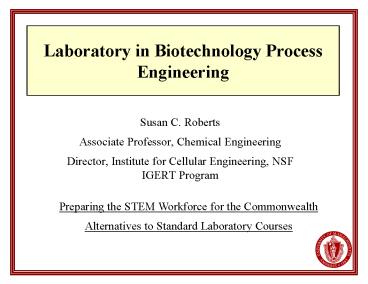Laboratory in Biotechnology Process Engineering PowerPoint PPT Presentation
1 / 14
Title: Laboratory in Biotechnology Process Engineering
1
Laboratory in Biotechnology Process Engineering
- Susan C. Roberts
- Associate Professor, Chemical Engineering
- Director, Institute for Cellular Engineering, NSF
IGERT Program
Preparing the STEM Workforce for the
Commonwealth Alternatives to Standard Laboratory
Courses
2
Preparing 21st century STEM professionals
- MA industrial focus in biotechnology,
pharmaceutical sciences and medical devices - Workforce development and preparation
- Training on state-of-the-art robotics
technologies - Communication skills
- Interdisciplinary approaches life sciences and
engineering/process sciences - Recruitment retention
- Programs at the interface of engineering and the
life sciences - Innovative curricula student driven, problem
focused, research based - Excellent job placement statistics
3
Overview
- Established with a Dreyfus Award in the Chemical
Sciences - Co-taught between Chemical Engineering and BMB
- 5050 representation of engineers and life
scientists (senior level) - Part of a two course sequence (lecture course in
previous semester)
4
Course design
- Groups of four students (two life scientists and
two engineers) ? interdisciplinary mindset,
teamwork, conflict resolution - Oral and written presentations for each module ?
communication skills - Hypothesis driven with a focus on experimental
design and data analysis ? problem solving and
research approach - Integration of high-throughput technologies ?
training on state-of-the-art industrial equipment
(first undergrad course in U.S. to use this
technology)
Goal Production of a protein biologic following
a pharmaceutical industrial model
5
Student driven and collaborative approach
- Student groups design experiments and choose
conditions based on preliminary results and
literature - Pilot experiments inform large scale
experiments - Collect data and analyze as a class to determine
optimal conditions in subsequent experiments at
the chalk board - Very interactive with a focus on interpretation
of results and next directions - Collaborative oral and written reports group
leaders established and member contributions
evaluated
6
Integration of research
- Hardy Lab (Dept. of Chemistry) express human
protein phosphatase 1 (hPP1) protein implicated
in HIV and cancer - Simple assay for activity exists
- Expressed in bacterial (E. coli) system
(solubility is an issue) - Purified using expensive/cumbersome
equipment/methods - Our goal - engineer an affinity tag onto hPP1 and
inducibly express hPP1 in E. coli for
large-scale production - Can we
- Clone the gene into an appropriate E. coli
expression vector? - Express tagged hPP1 appropriately in E. coli?
- Increase the solubility of hPP1 to recover and
retain activity? - Better control the expression of hPP1 in E. coli?
- Improve the purity and yield of hPP1 using the
affinity tag system? - Project can be made fresh each semester using
mutant forms of hPP1
7
Industrial component
- Industrial facility tour (e.g., Vertex
Pharmaceuticals, Cambridge, MA small molecule
structure based drug design) - Robotics equipment
- Product pipeline of drug discovery, synthesis and
testing to identify lead compounds for clinical
evaluation - Interaction with lead scientists regarding
science, economics and scale of operation - Industrial advisory board of Chemical Engineering
Dept. and Institute for Cellular Engineering
(ICE) focus on relevant skills - Alumni interaction with students
- Teach students skills relevant to industry (e.g.,
lab notebooks, GMP, high-throughput technology,
etc.)
8
Student feedback (all positive)
- Decision making
- Collaborative work (e.g., discuss results as a
class) - Co-instructor model with high level of
interaction amongst students and instructors - Preparation for work in the pharmaceutical
industry (several students said they would not
have gotten the jobs they have without the
experience in this course) - Students enjoyed and learned from the
troubleshooting that we did each day in lab - Ability to work with students from other majors
- Experimental techniques learned are fundamental
for any bioengineering project - Understanding of the big picture how a
process is designed and implemented - Transition from small scale to large scale
9
Summary
- Truly interdisciplinary laboratory course teach
students to cooperate and communicate across life
sciences and engineering disciplines - Emphasis on experimental design and
student-driven approaches - Focus on communication (oral and written)
- Possibility for two concurrent sections with
undergraduate and graduate students with new ISB - Research based select a new protein each year
so that course remains fresh - Continue to increase industrial involvement and
emphasis interaction with ICE - Use as recruiting and retention tool
10
(No Transcript)
11
Module 1Molecular Cloning of Target Gene
- Subclone a gene of interest into a suitable
expression vector for large scale production - Host expression system selection
- Expression plasmid considerations and design
- Directional cloning strategies
- Techniques PCR, DNA gel electrophoresis,
restriction digestion ligation, bacterial
transformation screening - OUTPUT expression strain to be used in
fermentation process
12
Module 2Protein Expression and Fermentation
- Perform pilot experiments to determine best
fermentation conditions at small scale - Inducible vs. constitutive expression
- Enzyme activity assays
- Effect of environmental conditions
- Temperature, pH, cell density, inducer
concentration, carbon source, etc. - Design and conduct controlled fermentation
experiment informed from pilot experiment results - Operation of New Brunswick fermentor
- Growth kinetics
- OUTPUT fermentation broth for purification
13
Module 3Protein Purification
- Cell disruption
- Each group evaluates potentially suitable methods
in a small scale experiment and decides on
conditions for extraction from fermentation broth - Protein purification
- Ammonium sulfate precipitation
- Gel filtration
- Affinity chromatography
- Calculate yield and relative activity to assess
purification success - OUTPUT purified protein for analysis
14
Module 4Protein Separation and Kinetic Analysis
- Protein separations using gel electrophoresis
- Western blotting to detect specific protein of
interest (antibody-antigen binding) - Enzyme kinetics calculation of Km and vm
- Determine time frame for experimental data
collection - Determine suitable enzyme concentration
- Conduct experiments over a range of substrate
concentrations - Compare activity /- HIS tag (added to protein to
aid in purification) - OUTPUT protein characterization and overall
assessment of project success

